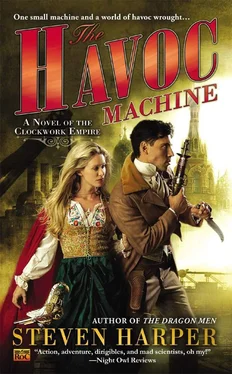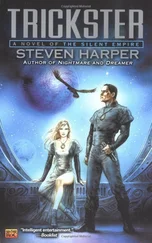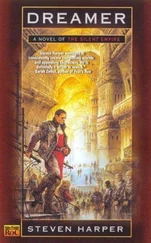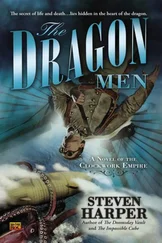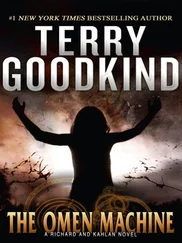Steven Harper - The Havoc Machine
Здесь есть возможность читать онлайн «Steven Harper - The Havoc Machine» весь текст электронной книги совершенно бесплатно (целиком полную версию без сокращений). В некоторых случаях можно слушать аудио, скачать через торрент в формате fb2 и присутствует краткое содержание. Год выпуска: 2013, ISBN: 2013, Издательство: ROC, Жанр: sf_fantasy_city, на английском языке. Описание произведения, (предисловие) а так же отзывы посетителей доступны на портале библиотеки ЛибКат.
- Название:The Havoc Machine
- Автор:
- Издательство:ROC
- Жанр:
- Год:2013
- ISBN:9781101601983
- Рейтинг книги:4 / 5. Голосов: 1
-
Избранное:Добавить в избранное
- Отзывы:
-
Ваша оценка:
- 80
- 1
- 2
- 3
- 4
- 5
The Havoc Machine: краткое содержание, описание и аннотация
Предлагаем к чтению аннотацию, описание, краткое содержание или предисловие (зависит от того, что написал сам автор книги «The Havoc Machine»). Если вы не нашли необходимую информацию о книге — напишите в комментариях, мы постараемся отыскать её.
The Havoc Machine — читать онлайн бесплатно полную книгу (весь текст) целиком
Ниже представлен текст книги, разбитый по страницам. Система сохранения места последней прочитанной страницы, позволяет с удобством читать онлайн бесплатно книгу «The Havoc Machine», без необходимости каждый раз заново искать на чём Вы остановились. Поставьте закладку, и сможете в любой момент перейти на страницу, на которой закончили чтение.
Интервал:
Закладка:
“He does everything you do and listens to everything you say.” Sofiya straightened her skirts and cloak and produced a handkerchief. “You know this.”
“Are you all right, Nikolai?” Thad asked.
“I’m all right,” he said. “They didn’t hurt me, but I think they would have. They said you had left the market and sent them to take me home.”
“Why didn’t you fight them like you did that boy?”
Nikolai shrugged. “I didn’t know how until now.”
Thad got to his feet. The alley swayed for a moment, and he braced himself against the wall until it settled down. The men who had attacked them didn’t move, though the boy still moaned softly. Thad took their knives away and examined them. Even in the dim light of the alley, he could see they were dull and of poor workmanship. A poor man’s tool, not even worth throwing away.
“What do we do with them?” he asked. “I’ve half a mind to saw their hands off.”
“Certainly not.” Sofiya was using the handkerchief to wipe muck off Nikolai’s face. “We will give them money and let them go.”
He stared at her. “Are you insane?” he blurted, and then, flushing, wished he could take the final word back.
“The famed clockwork madness has not begun for me yet.” She calmly put her handkerchief away without offering it to Thad, probably because it wouldn’t have done any good, then sprinkled a few coins over the men like a fairy godmother dropping golden tears on sleeping children. “We must go now. Don’t forget Dante.”
The wet, sewage-ridden muck was soaking through Thad’s gloves. He peeled them off, tossed them away, and gingerly plucked Dante from the alley floor. This time Sofiya offered up a handkerchief to wrap him in. They trudged back in the direction from which they had come, making sure Nikolai walked where they could see him. Nikolai stayed close, in any case.
“Look around you, Thad,” Sofiya said before he could ask about the money again. “This is how most of the people in Saint Petersburg live.”
She pulled them into a muddy street that was only slightly wider than the alley. Rickety buildings with ill-fitting doors and shutters leaned drunkenly over the byway. Men in ragged peasant clothing mingled with women in dirty head cloths. Children who had never seen a bath and whose clothes could barely be called clothing appeared to be playing in the street, but when Thad looked closer, he realized they were scavenging through the garbage and offal. The thick smell of human waste was omnipresent. People stared at the trio and their rich clothing as they passed, and they were quickly surrounded by children begging for coins. Thad kept a tight grip on his money.
“I will work for you, my lady,” said a boy. “Whatever you say. I will carry for you and sweep the street for you. Half a kopeck!”
“I will lie with you for two kopecks, my lord,” said a girl who wasn’t more than ten. “Even one and a half!”
Thad threw a handful of coins into the street, and the children bolted for them while he, Sofiya, and Nikolai hurried away past more hungry eyes that watched from doors and windows. Here there were no shops, no storekeepers, nothing to buy or sell but labor and human flesh itself, and all of it far too inexpensive. Thad heard shuffling. A small pack of plague zombies, the first ones he’d seen since leaving Vilnius, shambled through shadows near the mouth of an alley, avoiding the light. They were naked, not even a rag to cover themselves. Their hair hung in filthy strings, and their flesh was already rotting away from their bones as the plague ate its way through their bodies. Thad shied away automatically, and hoped they would die soon, partly so they stop spreading the plague and partly out of simple mercy. There was nothing to do for them, no way to cure them, no method of giving them comfort without risking contraction of the disease. Even putting a bullet through a zombie’s brain spread the plague in a spray of ichor and blood. The folk on the street knew it, too, and like Thad, they shied away from the alley.
“All these people are slaves, you know,” Sofiya said. “The landowners call them serfs and pretend that means they are attached to the land instead of its owners, but it is all the same. The people of this class must do as the landowners of the court bid them. The men and boys are conscripted into the army, sometimes for life with no pay. If the landowner or the tsar wishes something to be built or repaired, they conscript these people and work them to death. When Peter the Great”-she spat-“decided to build a city in a swamp and name it after himself, he brought in over a hundred thousand peasants, worked them until they died, and then brought in more.”
Her jaw trembled and her eyes were bright. Thad felt uncomfortable and didn’t know how to respond, so he remained silent.
“This is what most of Saint Petersburg is like,” Sofiya said, her mouth a hard line. “This is where my father lived when he came to the city to look for work. There are no doctors, no schools, no police. But when they find work in a house as a servant or a bedwarmer, the tax collector is there to ensure that the tsar and the landowner receive their share. It is no wonder those men took Nikolai. He represents more money than anyone here would earn in a hundred lifetimes. The money I gave them will feed their families for a month.”
“I’ve seen poverty,” Thad said. “Warsaw has quite a lot of it. And there were lean times for us before David-” His throat thickened unexpectedly at the mention of his son’s name, and Thad realized he was feeling shaky. Everything that had just happened came back at him with a rush, and he wanted very much to sit down, but there was nowhere to sit. Nikolai looked up at him, and Thad touched his shoulder with his free hand, feeling a wash of relief. All right. This wasn’t Warsaw. Nikolai wasn’t David. And anyway, Nikolai was a machine. His disappearance was simple theft, not kidnapping.
He finished, “There were lean times back when I owned a shop.”
“Then you understand,” Sofiya said.
“I understand,” Thad agreed. “I don’t sympathize, but I understand.”
They found their way back to the market and to Vanka, their driver, who was still dozing in his cab. Sofiya coughed loudly and he shot awake, then recoiled at the sight of them.
“You should never wrestle with a pig,” he observed gravely. “Even if you win, you lose.”
“We wish next to go to a bath house,” Sofiya said. “But first you must fetch our parcels from the hat seller over there.”
“You might also buy an old blanket from the rag man,” Thad added, “so we do not soil your magnificent cab.”
“I’m hungry,” said Nikolai.
Chapter Ten
Word got out that the tsar had commanded a performance from the Kalakos Circus, and during the days following Nikolai’s theft or kidnapping or whatever one wished to call it, the Circus played to stands that groaned beneath the weight of a full audience. People of all kinds came-workmen in dirty clothes, peasant farmers in homespun, chimney sweeps in sooty black, maids in head cloths, bored young noblemen in groups, soldiers in uniform, ladies in flounced dresses, and children in flocks and gaggles. Dodd played it to the hilt, wringing from them every drop of applause and cheer, which spurred the performers on to greater heights of artistry. The circus breathed again, lived again. Dodd walked about like a man in love, and more than once Nathan wrung Thad’s hand to thank him.
“He’s his old self now,” he lilted in his rich Irish English. “The whole circus is its old self again. Every night we go to bed thanking you and God and Mr. Griffin.”
Читать дальшеИнтервал:
Закладка:
Похожие книги на «The Havoc Machine»
Представляем Вашему вниманию похожие книги на «The Havoc Machine» списком для выбора. Мы отобрали схожую по названию и смыслу литературу в надежде предоставить читателям больше вариантов отыскать новые, интересные, ещё непрочитанные произведения.
Обсуждение, отзывы о книге «The Havoc Machine» и просто собственные мнения читателей. Оставьте ваши комментарии, напишите, что Вы думаете о произведении, его смысле или главных героях. Укажите что конкретно понравилось, а что нет, и почему Вы так считаете.
